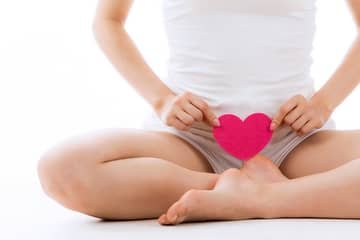
Fatigue, weakness and dizziness in pregnancy
Pregnancy is one of the most beautiful, but at the same time the most demanding periods in a woman's life. The external changes of a woman's body are only a visible fraction of what pregnancy causes in the body. The rest of the pregnancy symptoms, which also contribute to the aforementioned changes in a woman's appearance during the individual stages of pregnancy, take place inside the woman's body. Such symptoms include not only the typical morning sickness or changes in the tastes of a pregnant woman, but also fatigue, a feeling of general body weakness and dizziness during pregnancy.
We answered questions about what changes and processes in a woman's body contribute to the emergence of the aforementioned unpleasant pregnancy symptoms, how to prevent fatigue and dizziness. We also looked at how to deal with these difficulties during pregnancy.
When does fatigue start in pregnancy?
Fatigue and exhaustion are an inseparable part of pregnancy. The female body has to continuously get used to the excessive amount of changes that it goes through due to the emergence and development of a new life inside it.
Not only hormone levels are affected, but also metabolism as such. Thus, there are changes in several basic systems of the female organism, which in turn must somehow be reflected in the physiological health of the pregnant woman herself.
Individual changes in a woman's body begin already after fertilization and implantation of the egg in the uterus, so it is no surprise that fatigue or any other manifestations of a weakened organism and overburdened metabolism appear already in the first stage of pregnancy.

The worst is fatigue in the first trimester
The first stage of pregnancy brings with it a large number of unpleasant symptoms that a woman has to deal with. Fatigue is one of the initial symptoms that immediately take over a woman's body and indicate to her that certain changes are taking place in her body that require considerable attention.
The female organism and its individual processes must gradually adapt to the increased expenditure of energy or basic nutrients, the natural consequence of which is exhaustion and fatigue during pregnancy.
If a woman continues to receive the same amount of nutrients as before pregnancy, the body does not receive a sufficient amount of necessary substances for the proper functioning of the body and the simultaneous support of the development of the fetus. During this period of pregnancy, it is necessary to allow yourself the necessary rest, but also an adequate amount of healthy food.
However, hormonal changes taking place in the female body also contribute to fatigue, which result in mood swings and other manifestations of psychological discomfort. Sufficient relaxation in any healthy form is therefore essential not only from the physical side, but also from the mental side.
Sleep, rest and a healthy diet are important
As part of rest and relaxation, it is therefore advisable to observe a sleep regime and eliminate sleep deficits whenever possible. In the first trimester of pregnancy, it is also not recommended to perform demanding leisure activities, which can potentially increase the load even without such an exhausted organism.
However, the word "rest" should not be understood in the sense of lying in bed. It is necessary to maintain a healthy level of movement even in the primary phase of pregnancy, especially in the form of walks in nature, light sports or other physical activities ideal for pregnant women.
Of course, you have to think about the fact that in the first weeks there is a probability of an unwanted termination of pregnancy, or abortion much higher than in the later stages. It is therefore better to discuss individual physical activities with your doctor or another expert in this field.
Fatigue in the first trimester can also lead to an increased frequency and worsening of nausea, so it is recommended to implement as many steps as possible to help alleviate or completely eliminate these pregnancy symptoms.
From the point of view of a healthy diet, tired pregnant women in the early stages of pregnancy should especially pay attention to vegetables and fruits. Since the first trimester is characterized by stomach problems, light meals taken often and in small quantities are the best solution.
The intake of foods rich in necessary nutrients, such as iron, is also important. This substance also acts effectively as a prevention against excessive fatigue. Therefore, pregnant women should include beef, eggs, dried apricots, beans or various types of leafy vegetables in their diet.

There is less fatigue in the second trimester
The second trimester is characterized by its mildness within any symptoms. A woman leaves the symptoms of pregnancy in the first trimester, and between the 14th and 27th week, the most pleasant moments of pregnancy occur. Although excessive fatigue from the first trimester will pass, it is still important to stick to certain limits that a woman consistently set for herself in the first phase of pregnancy.
Potential fatigue in the second trimester of pregnancy is mainly associated with the fact that during this period the fetal movements are felt, which can lead to accidental awakenings in the middle of the night due to the increased activity of the developing baby. Despite the fact that a pregnant woman feels much better compared to the first weeks of pregnancy, there is no need to unnecessarily burden the body, which constantly contributes to the proper and healthy development of the growing fetus.
It is therefore necessary to think about this fact during every activity that a woman plans during this "quiet period" of pregnancy. It must be remembered that excessive strain on the body can cause potential complications, which every pregnant woman definitely wants to avoid.
Return of fatigue in the third trimester
Fatigue in the last stage of pregnancy is mainly related to substantial changes in the anatomy of the female body. The baby grows, which expands its natural environment in the uterus, which is reflected in the large pregnant belly, which significantly restricts and complicates the woman's movement. So it's no wonder that pregnant women are exhausted after a few steps and need to sit down immediately. Extra weight or loading of the lumbar spine by shifting the center of gravity due to the growing belly is only a fraction of the causes that lead to prenatal fatigue. Fatigue in the third trimester is also responsible for other reasons. A limited sleep regime is related to a growing belly. Pregnant women often have trouble finding the right and comfortable position to sleep, which increases their sleep deficit and exhausts their bodies.
Inside the body, there are also changes that burden and exhaust a pregnant woman. The growing baby needs more space for development, and therefore pressure is placed on some of the internal organs of the woman herself.
Frequent urination, which is also caused by the enlarging uterus, is the most common of these pregnancy complications. However, the baby also puts pressure on other organs. An example is the diaphragm, the compression of which manifests itself in worse breathing in a pregnant woman. Breathing and proper blood flow through a woman's body must be taken care of even during sleep. In the third trimester, it is more difficult for a woman to find a sleeping position because of her big belly. But instead of the comfort of a certain position, much more emphasis should be placed on ensuring that a specific position does not limit the basic functions of the body. In order for pregnant women to prevent large vessels from being pressed by the weight of the uterus, it is recommended to sleep on the left side. Blood flow will return to normal and body fatigue will not be a problem for this particular reason.
Fatigue before childbirth is a completely normal pregnancy symptom due to the big changes in a woman's body and the impending arrival of a baby. Again, not only physiological factors, but also mental ones will weigh here. During this period, the psyche of most pregnant women is burdened by various scenarios associated with childbirth or caring for a newborn.
Mental discomfort, which naturally manifests itself not only in a bad mood, but also in insomnia, and therefore fatigue, must be eliminated as much as possible. It is absolutely useless to burden your head with negative thoughts. They have no positive benefit for pregnant women and also rob them of the necessary sleep.

Dizziness in pregnancy
In addition to fatigue, pregnant women also experience dizziness, which can potentially end in passing out. Since many changes occur in the female body during pregnancy, certain difficulties related to feelings of weakness are completely natural.
Dizziness during pregnancy can be attributed not only to hormones, but also to the changing metabolism of a pregnant woman. Since a woman's body must deliver enough nutrients, vitamins and oxygen during pregnancy not only to herself, but also to the developing fetus, the demands increase.
The female body requires not only a greater supply of oxygen, but also increased blood production. The volume of blood in a woman's body increases by 1,000 to 1,500 milliliters during pregnancy. Blood vessels dilated by hormones enable the flow of more blood. Although the growth of the circulatory system already occurs in the beginning of pregnancy, the body of a pregnant woman does not react to this change immediately. This means that not enough blood is produced to fill the required volume measure of the vascular system. This condition can manifest itself by spinning the head.
Processes related to the formation of blood and the flow of oxygen in the body affect a woman throughout pregnancy, in the form of changing blood pressure. Its decrease is characteristic especially for the second trimester, which can be manifested by feelings of weakness and dizziness. In the third trimester, the blood pressure values subsequently return to normal, or their increase occurs. However, these changes can also lead to the feeling that the whole surrounding world is spinning.

How to avoid general weakness in pregnancy?
In the case of general weakness during pregnancy, the previously mentioned balanced diet, a sufficient amount of rest, but also a regular intake of fluids necessary for the proper functioning of the body are important. These principles apply to every pregnant woman, regardless of whether she is in the first or third trimester.
Momentary weakness can be caused by a drop in blood sugar. That is why pregnant women should regularly supplement their energy with a healthy and balanced diet. However, a preventive measure in the form of putting a small candy bar or cookie to fill you up in your purse won't hurt either. Something small for a quick energy boost always comes in handy.
If a pregnant woman has long-term problems with weakness, despite applying the above-mentioned principles, it is advisable to visit a doctor and consult a possible diagnosis. Many pregnant women have problems with iron deficiency in the early stages of pregnancy.
In such a case, the doctor will take a blood sample, and after detecting a deficiency of this substance, he will recommend high-quality dietary supplements containing iron. Pregnant women should always take nutritional supplements whose suitability for use during pregnancy is officially approved.
What works for dizziness during pregnancy?
In general, dizziness occurs especially in cases where a person stands up too quickly from a lying or sitting position. In order for a pregnant woman to avoid dizziness, such a way of getting out of bed or a chair needs to be changed as soon as possible.
Standing in one place for a long time is also not recommended, while pregnant women should also avoid poorly ventilated or even non-ventilated rooms. A lack of oxygen can lead to insufficient blood flow to the brain, which is reflected in the form of dizziness.
It is also necessary to follow a healthy lifestyle in the form of a regular diet and sufficient fluid intake. So that a pregnant woman does not burden her digestive tract, it is recommended to eat often in smaller portions. While the above steps work as a prevention against dizziness, if dizziness occurs due to a drop in blood pressure, it is advisable to know the basic principles of solving such a problem.
If a pregnant woman feels dizzy, it is advisable to lie down immediately. The ideal position is with the legs spread out, which allows the brain to get blood again. A pregnant woman who experiences dizziness must react to the initial signs of such a condition. This is the only way to prevent possible loss of balance, falling or even falling.
Especially during pregnancy in the summer months, women are advised to carry a bottle of water and something small under their teeth. It also applies outside of summer. Wherever a pregnant woman goes, she should think about the fact that her body supplies nutrients not only to her, but also to the next growing person. Therefore, it is always better to have everything you need at hand.

Why do pregnant women faint?
Dizziness, which causes a sudden drop in blood pressure, can very quickly develop into a complete loss of consciousness, or fainting. Every body is different, and that's why some women faint more often than others.
The feeling of fainting is manifested precisely by dizziness, blurred vision, nausea and a general feeling of weakness. If a pregnant woman experiences any of these symptoms, it is necessary to immediately find a place suitable for taking a sitting position, or lying down with the legs raised above the level of the head. While dizziness or feeling weak may not be dangerous for the woman and baby, fainting is associated with a potential fall on a harder surface, which can cause more serious injuries. Pregnant women should avoid cramped spaces with a lack of oxygen, as well as prolonged standing in one place.
Since the aforementioned dizziness and feelings of weakness during pregnancy are some kind of warning signs of potential fainting, it is advisable to follow the principles helping to prevent such a situation.
Therefore, pregnant women should strictly pay attention to their drinking regime, regularly consume food and the necessary nutrients to supply energy. They should always and everywhere carry a drink with them, or some small snack to increase the sugar level.
Fatigue, dizziness in pregnancy - experience
Although fatigue is theoretically associated mainly with the first and third trimesters, some of the women discussing it also felt it in the early weeks of the second trimester of pregnancy. It is important to allow yourself a sufficient amount of rest, if of course it is possible, and possibly take magnesium, which can help in this area.
In connection with dizziness and the feeling of fainting, some discussants noted that it is better to go everywhere with a bottle of water ready, while others even preferred not to go anywhere alone for fear that they might faint somewhere on the street. They also added that it is always necessary to eat before leaving the house. Hunger is often the reason why a pregnant woman's body starts to feel weak and has a sudden drop in blood pressure.
The most frequent questions - FAQ
If you did not find the information you were looking for in our article on fatigue, weakness and dizziness in pregnancy, do not hesitate to refer to our question and answer section, where we have covered other aspects of this issue. If you have further questions about what you have read, our comments section is open for you. We try to respond to all comments as soon as possible.
Can I be in the sun during pregnancy?
Do dizziness threaten the baby's health in any way?
Is the cause of vertigo while lying down different from standing vertigo?
Can I bathe in hot water during pregnancy?
Pridať komentár







